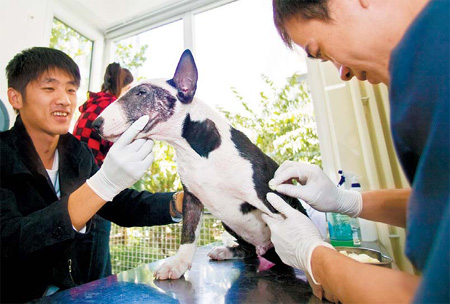Biz Unusual
Vets team up for pet clinic
By Todd Balazovic (China Daily)
Updated: 2009-10-30 08:13
|
|
Anthony Beck, British CEO of Dorctors Beck and Stone Pet Health Care Center in Beijing, is sitting in his UK flat more than 8,000 km away consulting with Shi Yingbin - also known as Dr Stone - about how to treat a puppy that has been hit by a car.
Using a Web cam, the two discuss treatment options while the injured patient and its distraught owner wait in Beijing's only Western-style veterinary practice. Xiao Sui - Small Sunflower - and owner Estrella Deng are both whimpering as assistants tend to the puppy's injuries.
For Deng, a first-time pet owner, the only option for her puppy was finding what she saw as the best care.
"I heard about this clinic from my neighbor," she said. "I have never really been to a pet hospital before, but they have made me feel very comfortable here."
The clinic on Baiziwan road in Chaoyang district advertises itself as "the only Western-style pet hospital in Beijing".

While it uses both Western and traditional Chinese medicine, the clinic is different than the usual approach in China due to its philosophy and focus on domestic pets, said the hospital's Director Nis Peter Lorentzen.
"China has seen huge growth in the number of pet owners over the last 10 years," he said. 'But veterinary colleges in China still focus largely on treating agricultural animals rather than small pets."
The clinic treats not only a pet's physical health, but also its psychology, he said. It recently hired Dr Sara Platto, an Italian pet behavior therapist, to help Chinese and Western pet owners care for their animals.
"It's not just about training the pet, it's about training the owner as well," said Dr Beck.
The clinic's clientele - more than 70 percent local Chinese - reflect the growing number of pet owners in Beijing. The majority are young couples under 30 years old, said Lorentzen.
The biggest difference in Western and Chinese clients is their attitude about treatment, said Dr Beck, who has been practicing animal medicine for almost two decades.
"Our Western clients might have lived with pets their whole lives, so they understand how veterinary practices work," he said.
"Sometimes our Chinese clients don't understand that the medicine takes time to work and they may lose patience."
| ||||
"Chinese pet owners are amazingly close to their pets," said Dr Beck. "They treat them like young children."
While the majority of the vets' patients are cats and dogs, they have also treated their fair share of exotic pets, said Dr Stone.
"We've seen animals ranging from parrots, iguanas and rabbits to potbelly pigs," he said.
Beck and Stone opened their clinic three years ago after the two worked side by side at the Beijing Guanshang Animal Hospital.
"After two years I left and set myself up at Dr Stone's hospital," Dr Beck said. "A few months later we decided to make it a permanent arrangement."
In addition to providing healthcare for the pets, the clinic also acts as a training center for up-and-coming veterinarians.
Combining their expertise, the doctors offer training in all aspects of the profession from doctors to lab technicians to pharmacists, said Lorentzen.
They are looking to expand their operation and plan to begin construction on a new clinic in the next six months in Shunyi, he added.














